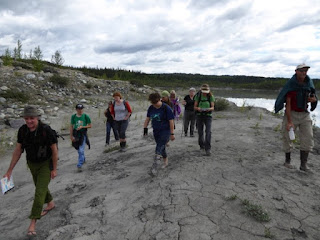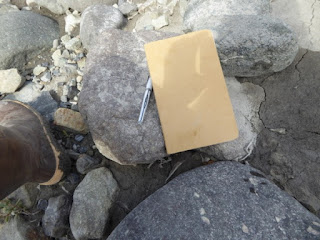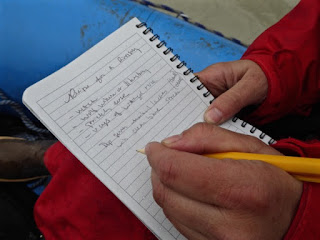We were part of Riversong, a writer and songwriter’s workshop held by The Wrangell Mountains Center and organized by force of nature Nancy Cook. The workshop itself consisted of two days of meals, writing hikes, and classroom time in McCarthy, then four days rafting the Kennicott, Nazina, Chitina, and Copper Rivers. Those two days before the rafting trip began established both a rapport and a work ethic. Everyone was grateful for the time to write and the energy of fellow writers, so we all grabbed our notebooks and jotted down “blurts,” as instructor Frank Soos called them, at any opportunity.
During Riversong I fell back in love with my notebook. I never had abandoned it, really—I’m a passionate paper and pen geek—but just as often as not, I might reach for my phone to jot a note, or compose something on my computer. On the river, we had only our paper and pens, and I was reminded of all of the reasons I love writing by hand. I began to think of it as “slow writing.” Just as the “slow food” movement highlights the ways that cooking from scratch can draw our attention and enjoyment to food, “slow writing” has advantages over typing. I’m typing right now. I haven’t abandoned it as a method of composing, but I’m interested in the differences between my brain on a keyboard and my brain in a notebook.
I noticed when “slow writing,” that my mind had to pause and wait for my hand. When I type, my fingers can move at a pace closer to that of my thoughts. When I write, I slow to the speed at which I can form each word on the page. I enjoy watching the words appear, so I’m engaged not only thinking but in an observation of the physical words and in the tactile experience of putting my favorite pen on my favorite paper. If I do have a tangential thought, I can jot it down easily in a corner, make a note or a doodle right there on the same page as whatever I’m writing. I can write in circles or diagonal lines using words to create and fill spaces that match the shapes of my ideas.
Composing on a computer is more linear than using a notebook. Each line forms below the one before, and I don’t stop to sketch or draw an arrow to a thought bubble or make a list about something completely unrelated to this subject. I don’t page back and look at what I wrote yesterday. On the other hand, my computer makes it easy for me to edit, so the critical part of my brain is turned on and I’m creating differently; I’m composing and revising nearly simultaneously.
My notebook is also one giant step away from the omnipresent click-to-publish opportunity of the Internet. I can’t highlight a word and look up a definition, or instantly research a question that comes up when I write. There’s no button that turns a sentence fragment or foiled poem into a blog post. There’s a freedom in the analog that allows for more exploration and risk.
Every time I sat down to write this piece I got distracted by the other parts of my digital life that grab my attention: social media interactions for the theatre where I work, posting photos to Instagram, reading articles online and sharing social justice rants with my friends. Everything seems important enough to do in its moment, and yet, I still feel that tug of the river. I can almost see my inspiration swirl into the giant flow of the rest of my life and lose its distinct, cherished color. I want to to navigate towards those currents that support focus and buoy creative thought. Riversong capsized routine and allowed me to be immersed in my writing; now I’m back on dry land, but I still have my paper raft and ink-filled paddle.
Amy O’Neill Houck recently finished her MFA in creative nonfiction at UAA. She lives in Juneau, and occasionally writes feature stories for The Juneau Empire and The Capital City Weekly. Amy works at Perseverance Theatre, and in her off hours, she teaches ukulele and knitting. Usually not at the same time.




When you have no time for writing, of course, you can cope with writing an essay; but the quality of such essay won't be high enough. If you must write an essay very quickly, you won't have a possibility to plan and revise it properly. In such a case, I'd like to use the help of good essay writing service. Here is one of them: http://www.professional-essay-writing.com.